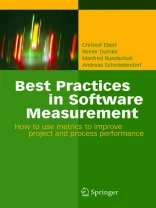Not everything that counts can be counted. Not everything that is counted counts. Albert Einstein This is a book about software measurement from the practitioner’s point of view and it is a book for practitioners. Software measurement needs a lot of practical guidance to build upon experiences and to avoid repeating errors. This book t- gets exactly this need, namely to share experiences in a constructive way that can be followed. It tries to summarize experiences and knowledge about software measurement so that it is applicable and repeatable. It extracts experiences and lessons learned from the narrow context of the specific industrial situation, thus facilitating transfer to other contexts. Software measurement is not at a standstill. With the speed software engine- ing is evolving, software measurement has to keep pace. While the underlying theory and basic principles remain invariant in the true sense (after all, they are not specific to software engineering), the application of measurement to specific contexts and situations is continuously extended. The book thus serves as a ref- ence on these invariant principles as well as a practical guidance on how to make software measurement a success.
Table of Content
Making Metrics a Success — The Business Perspective.- Planning the Measurement Process.- Performing the Measurement Process.- Introducing a Measurement Program.- Measurement Infrastructures.- Size and Effort Estimation.- Project Control.- Defect Detection and Quality Improvement.- Software Process Improvement.- Software Performance Engineering.- Service Level Management.- Case Study: Building an Intranet Measurement Application.- Case Study: Measurements in IT Projects.- Case Study: Metrics in Maintenance.- Metrics Communities and Resources.
About the author
Reiner Dumke is since 1994 a full professor in software engineering at the university of Magdeburg. His research interests include SW metrics, measurement programs, tools, web security and performance engineering. He is speaker of the german Informatics Society (GI) Expert group on Metrics. He has published and lectured extensively on SW metrics and related topics.
Christof Ebert is Director Software Coordination and Process Improvement of Alcatel in Paris, France. He drives R&D innovation and effectiveness programs within Alcatel. Before, he lead the biggest Alcatel Business Unit to CMM L3, achieving substantial quality improvements and cycle time reduction. Dr. Ebert is IEEE Software associate Editor-In-Chief and serves as keynote speaker and on program committees of various software engineering conferences.
Manfred Bundschuh is President of DASMA e.V., the German metrics organisation, as well as appointed Professor for Project Management and Teamwork at the University of Applied Sciences, Cologne, Dept. of Informatics and IT Quality Manager in AXA Service AG, Cologne. Manfred Bundschuh is author and editor of several books and more than 40 publications.
Andreas Schmietendorf works as competence manager for system- and software development in the information technology department of Deutsche Telekom AG. As chief architect within the development center Berlin Dr. Schmietendorf is mainly responsible for integration- and migration-projects. He is an active member in the German society of computer science (GI) and the Central Europe Computer Measurement Group (CECMG). Furthermore Dr. Schmietendorf teach as guest-lecturer at the University of Magdeburg and FHTW Berlin (University of applied science).












